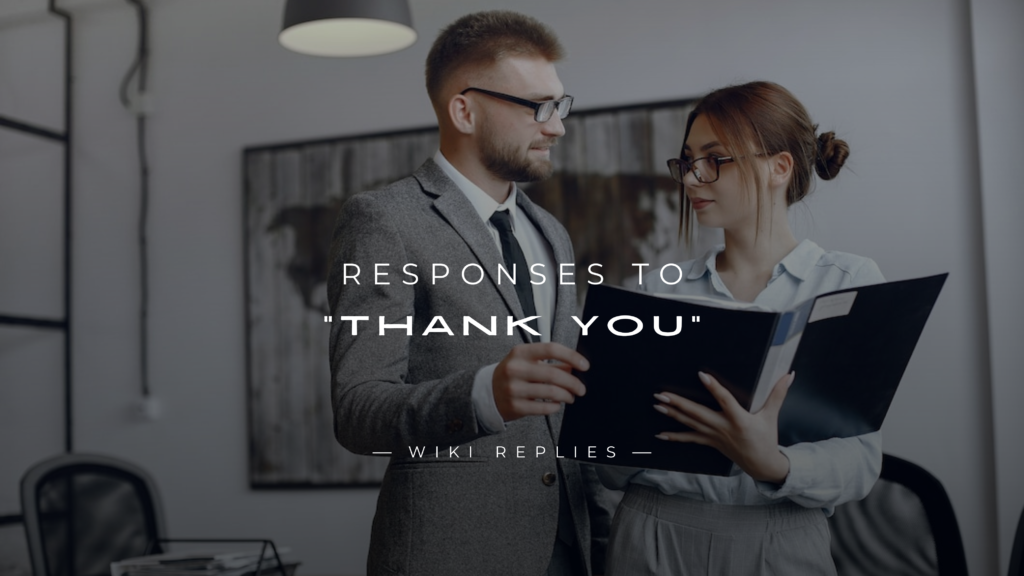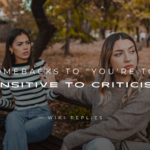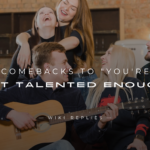Ever found yourself caught off-guard when your boss says, “Thank you”? Whether it’s for handling a task well, staying late to meet a deadline, or just being your reliable self, it can feel like a curveball if you’re not sure how to respond.
Let’s be real—receiving praise at work, especially from your boss, is one of those things we don’t talk enough about. It’s great when it happens, but many of us freeze or brush it off out of awkwardness or humility. But here’s the truth: your response to that simple “thank you” matters more than you think. It’s not just about being polite. It’s about showing confidence, professionalism, and emotional intelligence—all in a few words.
In this article, we’ll break down everything you need to know about how to respond to “thank you” from a boss—gracefully, professionally, and with the kind of warmth that leaves a positive impression.

220+ Responses to “Thank You” From A Boss
Direct Acknowledgment
- You’re welcome.
- No problem at all.
- Glad I could help.
- Anytime!
- It was my pleasure.
- Happy to do it.
- Of course.
- Absolutely.
- Sure thing.
- Don’t mention it.
Mutual Appreciation
- Thank you—I really value your support as well.
- I appreciate you saying that.
- Means a lot coming from you—thank you.
- Likewise, I’m grateful to be on this team.
- I truly appreciate the opportunity.
- Thank you—I’ve learned a lot under your guidance.
- That really encourages me. Thank you!
- Thanks—I feel the same way about working with you.
- I’m lucky to be here. Thank you for trusting me.
- I appreciate your leadership—thank you.
Team Credit
- I couldn’t have done it without the team.
- The whole team deserves the credit here.
- Everyone really pulled together on this one.
- I’ll make sure to pass that along to the others too.
- It was a group effort—we all gave our best.
- I’m proud of how well the team collaborated.
- Honestly, the credit goes to the whole crew.
- I just played my part—everyone contributed.
- We work well as a unit, and it showed.
- It was definitely a shared win.
Mission-Focused
- Just glad to help move things forward.
- It’s great to see our goals coming together.
- I’m just focused on what’s best for the company.
- Happy to be part of the progress we’re making.
- Everything I did was in service of the bigger picture.
- We’re aligned, and that’s what makes things work.
- I’m here to get results—thanks for noticing.
- Just doing what needs to be done for success.
- Pushing the mission ahead is what motivates me.
- It’s all about creating impact.
Forward-Looking
- Looking forward to what’s next!
- Let me know how I can support the next step.
- Excited to keep the momentum going.
- Can’t wait to see what we tackle next.
- I’m ready for the next challenge.
- Let’s keep building on this.
- There’s more we can do—I’m in.
- This is just the beginning.
- Count me in for what’s ahead.
- I’m here to keep things moving.
Growth-Oriented
- I learned a lot through this—thank you for the chance.
- This helped me grow, professionally and personally.
- I appreciate the opportunity to stretch my skills.
- Each project teaches me something new.
- I’m grateful for the learning experience.
- It challenged me in the best way.
- I feel like I leveled up through this.
- This helped me refine how I approach problems.
- Thanks for letting me take this on—it helped me grow.
- Every step of this helped sharpen my abilities.
Humble/Modest
- Just glad I could contribute.
- I’m happy it worked out.
- I was just doing my part.
- Really appreciate that, thank you.
- That means a lot—thank you.
- I’m just grateful to help however I can.
- It was the least I could do.
- I’m always learning—thank you.
- Just trying to stay helpful.
- I appreciate the kind words.
Professional Courtesy
- Thank you, I appreciate the recognition.
- It’s a pleasure to work under your leadership.
- Thank you—I value being part of this team.
- I’m honored by your kind words.
- Thank you for your continued trust.
- I’m grateful to be in this role.
- I appreciate your acknowledgment.
- Thank you for your thoughtful feedback.
- I’m committed to maintaining this standard.
- Your appreciation means a lot to me professionally.
Offering Continued Support
- Let me know if there’s anything else you need.
- Always happy to support however I can.
- I’m here if anything else comes up.
- Just say the word—I’ve got your back.
- I’m available if you need help with the next steps.
- Please don’t hesitate to reach out again.
- Let me know what else I can take off your plate.
- I’m more than willing to assist wherever needed.
- I’m ready for the next task whenever you are.
- Just keeping things moving—let me know what’s next.
Feedback-Seeking
- Thanks—if you have any suggestions, I’d love to hear them.
- I’m always open to feedback if there’s anything I can improve.
- Appreciate that—let me know if there’s anything I could do better.
- I’d love to know how that landed overall—did it meet your expectations?
- If you see any room for growth, I’m all ears.
- Thank you! And I’m always looking to sharpen my approach.
- It helps to hear that—what could I improve next time?
- Your insights help me get better, so I welcome any thoughts.
- I want to keep learning—was there anything you’d tweak?
- Thanks, and if you have any notes, I’m ready for them.
Confidence-Expressing
- I felt good about how it turned out—thank you.
- I knew we could make it happen.
- I was confident we’d get it done right.
- I trusted the process, and it paid off.
- That’s the level I always aim for.
- I try to bring my best every time—glad it showed.
- I appreciate that—it’s what I strive for.
- That’s the kind of impact I hope to keep making.
- Thanks—it aligns with how I like to operate.
- I believed in this approach, and I’m glad it worked.
Positive Emotion Sharing
- I really enjoyed working on that.
- That project was genuinely rewarding.
- It felt great to contribute in that way.
- I’m proud of how that came together.
- That outcome made my day.
- Honestly, that was a fun challenge.
- It’s always energizing to work on things like this.
- I walked away from that feeling accomplished.
- It felt good to see it all come together.
- That was a highlight of my week.
Recognition Redirecting
- Honestly, [Name] really helped bring this to life too.
- I’d say the credit should go to the whole team.
- I couldn’t have done it without [colleague/team].
- [Name] deserves a shoutout as well—they were a huge part of it.
- I appreciate that, but a lot of hands made this happen.
- I had great support throughout, especially from [Name].
- Everyone contributed—I just helped steer it.
- It was very collaborative from start to finish.
- [Name] made a big impact behind the scenes, too.
- I’ll be sure to pass that recognition to the team.
Responsibility Acceptance
- I take full ownership of that, and I’m glad it worked out.
- That was on me—I made sure to see it through.
- I made it a priority, and I’m glad it paid off.
- I knew this one mattered, so I leaned into it.
- I took that responsibility seriously, thank you for trusting me with it.
- That was part of my role, and I made sure to deliver.
- I was accountable for the outcome, and I’m glad we got it right.
- I stayed on top of it to make sure it landed.
- Thanks—I felt responsible for making it happen.
- I saw it through to the end, and I’m proud of that.
Reciprocal Professionalism
- Thank you—it’s always a pleasure working under your leadership.
- I appreciate the recognition—it means a lot coming from you.
- Thanks—I’m just aiming to reflect the standards you’ve set.
- That’s kind of you to say—I respect the way you lead.
- I try to carry the professionalism that’s modeled from the top.
- It’s easy to do good work when the expectations are clear.
- Thanks—it’s great working in such a supportive environment.
- I appreciate how you empower us to deliver our best.
- That acknowledgement goes a long way—thank you.
Informal/Friendly
- No worries at all!
- Anytime—you know I’ve got it.
- Just doing my thing!
- Appreciate it—glad I could help out.
- That one was actually kind of fun.
- You know I enjoy this kind of stuff.
- Always happy to jump in.
- Not a problem, happy to make it happen.
- That’s what I’m here for!
- Easy win—glad it worked out.
Process-Oriented
- I followed the plan closely, and it worked out.
- I made sure to keep everything on track step by step.
- A clear process really helped drive the results.
- I kept things organized, which made the difference.
- I leaned on the workflow we mapped out.
- It helped having a solid structure to follow.
- I kept an eye on the details throughout.
- A lot of it came down to staying methodical.
- I stuck to the process, and it paid off.
- Consistency and planning really drove the outcome.
Initiative-Highlighting
- I saw an opening and decided to jump in.
- I figured it needed doing, so I took the lead.
- I tried to stay ahead of it where I could.
- I wanted to get out in front of this one.
- I took the initiative and just ran with it.
- I recognized the need early on and stepped in.
- I didn’t wait—I just went for it.
- I saw a gap and worked to fill it.
- I tried to be proactive with this one.
- I wanted to be one step ahead for this.
Values-Aligned
- This really aligns with what I care about professionally.
- I try to stay grounded in our values, and this felt like a great fit.
- I always aim to reflect our core principles in my work.
- It’s meaningful when the work connects with our mission.
- I’m driven by purpose, and this project had that.
- This reflected the kind of integrity we strive for.
- I care deeply about doing the right thing, and this felt right.
- I try to work in a way that matches our culture.
- This is exactly the kind of impact I want to make.
- I want my work to stand for something—this did.
Reflective
- I learned a lot through the process.
- It gave me a new perspective on how we operate.
- It really helped me understand our systems better.
- I appreciated the chance to grow through this.
- This one taught me a few valuable lessons.
- I’ve already thought of ways to improve next time.
- It pushed me out of my comfort zone—in a good way.
- I see clearly now how I can do it even better.
- I’ve reflected on what worked well and what didn’t.
- I’ll definitely take these learnings forward.
Relationship-Building
- I’m really glad we get to work together on things like this.
- Your support makes a big difference—thank you.
- I feel lucky to have a boss who notices the effort.
- This kind of collaboration is what I enjoy most.
- Working with you on this really strengthened my motivation.
- I appreciate the trust—that builds real confidence.
- Thank you for creating space for work like this.
- I respect the way we’re able to partner on these challenges.
- The way we communicate really helps things run smoothly.
- I value our working relationship—it makes a difference.
Context-Aware
- I know this one was especially important—glad it went well.
- With everything going on, I knew this needed extra care.
- I understand the timing made this critical.
- Given how high-profile this was, I made sure to be thorough.
- I knew this had a lot of visibility, so I focused hard.
- With the tight timeline, I tried to stay ahead at every step.
- I recognized this had big implications, so I didn’t take it lightly.
- I adjusted based on how things were unfolding.
- I kept the larger context in mind the whole way through.
- I understood the urgency and responded accordingly.
Understanding Workplace Gratitude
- The Power of Appreciation in Professional Settings
Workplace gratitude isn’t just about being nice—it’s a fundamental part of good leadership and a healthy company culture. When your boss says “thank you,” they’re doing more than showing good manners. They’re acknowledging your value. That moment, though small, can boost morale, inspire loyalty, and increase productivity. When leaders recognize contributions, employees feel seen—and that’s a big deal.
- Why Bosses Say “Thank You”
Bosses express appreciation for all kinds of reasons: completing an important project, stepping up in a crisis, mentoring a colleague, or consistently performing well. But sometimes, it’s not about a specific achievement—it’s about reinforcing a culture of mutual respect. Regardless of the reason, when your boss says “thank you,” they’re signaling trust and respect. And that’s your cue to respond in kind.
The Psychology Behind Responding to Compliments
- Acknowledging vs. Downplaying
It’s tempting to respond with “Oh, it was nothing,” or “Just doing my job.” We think we’re being modest, but what we’re actually doing is minimizing our effort—and dismissing the appreciation we’ve just received. Instead, try acknowledging the compliment with a warm, confident response. You don’t have to boast, but you also shouldn’t shrink away from the recognition you’ve earned.
- Cultural and Personality-Based Differences
Some cultures teach us to deflect praise; others encourage us to accept it openly. Likewise, introverts may find praise uncomfortable, while extroverts might embrace it more easily. No matter your background, it’s worth learning how to respond gracefully. It’s not about changing who you are—it’s about building habits that serve you professionally.
Simple, Polite Responses That Always Work
Saying “You’re Welcome” the Right Way
“You’re welcome” might sound basic, but when delivered with sincerity, it’s a classic response that works in any professional setting. Pair it with eye contact, a smile, and a calm tone, and you’ve got yourself a respectful, polished reply.
Other Respectful Alternatives
Looking to mix it up a bit? Here are a few safe and effective responses:
- “My pleasure.”
- “Glad I could help.”
- “Thank you for saying that.”
- “Anytime—thanks for your support.”
Each of these shows professionalism and gratitude without coming across as boastful.
Professional Yet Friendly Responses
Adding a Touch of Gratitude Back
Want to take your response a step further? Echo the gratitude with something like:
- “Thank you! I appreciated the opportunity to take that on.”
- “Thanks—it was a great experience working on it.”
- “I’m grateful for the support along the way.”
This kind of reply creates a two-way street of appreciation and shows that you’re not just a task-taker—you’re someone who values growth and collaboration.
Keeping It Humble and Warm
Keep your tone conversational. Avoid trying to sound overly formal or robotic. For example:
Instead of:
“I endeavored to fulfill my responsibilities effectively.”
Try:
“I’m really glad it turned out well—thank you!”
The second one feels real. And that’s what people remember.
When the “Thank You” Comes via Email or Message
Crafting a Short and Effective Written Reply
In written form, a short, well-worded reply goes a long way. Try this structure:
- Acknowledge the gratitude.
- Reflect briefly on the work.
- Express appreciation in return.
Here’s an example:
Hi [Boss’s Name],
Thank you so much for your kind words. I really enjoyed working on this project and appreciated your guidance throughout. Looking forward to what’s next!
Best,
[Your Name]
Email Etiquette Tips
- Reply within a reasonable time (ideally within 24 hours).
- Keep your tone warm, but professional.
- Avoid emojis unless you’re in a super casual work culture.
- Use proper grammar, even in short replies.
Responding in Public vs. Private Settings
When Coworkers Are Around
If the thank-you is delivered during a meeting or in a group chat, it’s best to reflect team spirit. Say something like:
- “Thanks! It was definitely a team effort.”
- “Appreciate that—we all pulled together on this.”
This keeps the praise from feeling self-centered and highlights your collaborative mindset.
One-on-One Acknowledgments
In a private setting, you can be a bit more personal and direct:
- “Thanks, that really means a lot.”
- “I appreciate that—I enjoyed working on it.”
These responses help deepen your professional relationship without feeling forced.
What Not to Say to a Boss’s Thank You
Avoid Sarcasm or False Modesty
Humor doesn’t always land the way you think it will. Comments like:
- “About time someone noticed!”
- “Well, someone had to do it!”
…can easily come off as disrespectful or awkward. Even if you’re joking, it may not be received that way.
Watch Out for Awkward or Dismissive Replies
Saying “It was nothing” or “Just lucky, I guess” might feel modest, but it actually undermines your credibility. Instead, own your contribution in a way that’s gracious and grounded.
Tailoring Your Response Based on Context
After Completing a Big Project
This is your moment to reflect and show maturity:
- “Thanks! I’m proud of how it turned out. Appreciate your support during the process.”
When Receiving a Compliment in a Group Setting
Make it about the team:
- “Thank you—we all worked really hard to make it happen.”
If You’re Being Thanked for a Small Favor
Keep it light and simple:
- “Of course—happy to help!”
No need to overthink these moments. A kind tone says more than long-winded words.
Body Language and Tone Matter
Non-Verbal Cues That Support Your Message
Your words matter—but your body language speaks volumes too. When responding, aim to:
- Maintain eye contact.
- Smile genuinely.
- Keep your posture relaxed but engaged.
Even a simple nod, when paired with a warm expression, can reinforce your message powerfully.
Confidence Without Arrogance
Confidence is saying, “Thank you. I worked hard on that, and I’m glad it helped.”
Arrogance is saying, “Well, I knew it would be a hit.”
Stay grounded. Own your success, but don’t flaunt it.
Responses That Leave a Good Impression
Building Rapport with Leadership
If you want to build stronger rapport with your boss, a thoughtful reply goes a long way:
- “That means a lot coming from you—thank you.”
- “I really appreciate you saying that. I value your feedback.”
These replies show maturity and openness.
Positioning Yourself as a Team Player
Even when the praise is directed solely at you, acknowledge the broader picture:
- “Thanks! I couldn’t have done it without [colleague or team’s] input.”
This shows humility and builds your reputation as a collaborative professional.
Responding with a Growth Mindset
Use the Opportunity to Ask for Feedback
You can use a “thank you” as a door to constructive dialogue:
- “Thank you! I’d love to hear any feedback you have to help me keep improving.”
That kind of response shows confidence, curiosity, and professionalism.
Show Initiative Without Overdoing It
You can gently open the door to more opportunities:
- “Thanks! If any similar projects come up, I’d be happy to contribute again.”
Just be careful not to overdo it every time. Keep it natural.
Cultural Considerations in Workplace Gratitude
How Appreciation Is Received in Different Countries
In the U.S. and Canada, verbal thanks are frequent and casual. In Japan, praise may be more subtle and indirect. In Scandinavian countries, over-praising can sometimes feel disingenuous. Recognizing these differences can help you respond appropriately in international settings.
Adapting Your Response Style Accordingly
When in doubt, aim for respectful neutrality:
- “Thank you, I appreciate that,” works across most cultures and industries.
Common Scenarios and Sample Replies
Sample Responses to a Thank-You After a Meeting
- “Thanks! I’m glad I could add value to the conversation.”
- “Appreciate that—looking forward to what’s next.”
Sample Replies When Praised for Good Work
- “Thank you, that means a lot. I put a lot of thought into this one.”
- “I’m really happy it turned out well—appreciate your support.”
When to Let the Thank You Speak for Itself
Sometimes Silence Is Golden
In casual or fast-moving situations, you don’t always need words. A simple nod, smile, or even a thumbs-up (if that fits your company culture) can be more than enough.
Non-Verbal Acknowledgment Techniques
Use:
- A warm smile.
- Gentle nod.
- Confident eye contact.
These subtle signals often speak louder than words.
Conclusion
Mastering the art of responding to a simple “Thank You” from your boss can go a long way in shaping your professional image and reinforcing mutual respect. Whether you’re aiming to be concise, appreciative, or motivational, the right words can make a lasting impact. Use these 220+ responses as a resource to strengthen your workplace communication and leave a positive impression every time. If you’re also looking to refine how you open your emails, don’t miss our guide on the 220+ Best Ways to Say “Good Afternoon” in An Email to keep your correspondence polished and professional.
FAQs
Q. What if I feel awkward responding to praise?
That’s totally normal. A simple, sincere “Thank you, I appreciate that” works well and gets easier with practice.
Q. Is it okay to just smile or nod?
Yes—especially in fast-paced or informal situations. Just make sure your body language is warm and open.
Q. How do I respond without sounding arrogant?
Keep it simple and grateful. Avoid exaggerating your role or minimizing others’ contributions. Think: “Thanks! I’m glad it worked out well.”
Q. Can humor work in my reply?
It depends on your boss and the culture. Light humor can be fine, but steer clear of sarcasm or anything that could be misunderstood.
Q. What if I didn’t think I did anything special?
Even if it felt routine to you, it made a difference to your boss. So accept the appreciation graciously—“Thanks, I’m glad I could help.”










